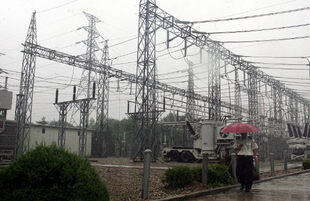hankyoreh
Links to other country sites 다른 나라 사이트 링크
Korea Electric Power Company placed on terror list

The U.S. Securities and Exchange Commission (SEC) placed South Korea’s electric power monopoly Korea Electric Power Corporation (KEPCO) on a list of companies doing business with state sponsors of terrorism, prompting an outcry from the Seoul government demanding its immediate removal from the list.
On June 25, the SEC opened a state sponsor of terrorism section on its web page (www.sec.gov) on which it listed KEPCO as a company doing business with North Korea, which has been designated by the U.S. State Department as a state sponsor of terrorism along with Cuba, Iran, Sudan and Syria. Along with KEPCO, HSBC, Reuters, Nokia, Unilever, Siemens, Deutsche Bank and other globally-renowned enterprises were cited. By country, 43 companies were listed as those with ties to Iran, followed by Sudan with 32, Cuba with 22, Syria with 19 and North Korea with 5, respectively.
KEPCO was included on the black list since it has a record of participating in projects spearheaded by the Korean Peninsula Energy Development Organization (KEDO) to build light-water nuclear reactors in North Korea under the 1994 Agreed Framework between Washington and Pyonyang. KEDO, which was chartered in 1996 and is an international consortium involving South Korea, the U.S. and Japan, is aimed at constructing two commercial light water reactors in North Korea with a total capacity of 2,000 megawatts in return for certain nuclear non-proliferation steps to be taken by North Korea. The project was closed halfway, with construction unfinished, after the North was suspected by the United States of having an undeclared program to enrich uranium in 2002.
Another reason cited by the SEC has to do with KEPCO’s efforts to provide electricity to an industrial complex in the North Korean boarder city of Kaesong. As the Kaesong Industrial Complex was jointly established by South and North Korea in late 2004, KEPCO was selected by electricity provider for the complex. It currently supplies electricity to the complex through a 22.9 kilovolt distribution network.
SEC Chairman Christopher Cox explained that the listing of companies was intended to help investors get a clearer picture of businesses in which they put their money. ‘‘No investor should ever have to wonder whether his or her investments or retirement savings are indirectly subsidizing a terrorist haven or genocide state,’’ Cox said in a statement.
In response, the Seoul government and KEPCO demanded that the SEC take immediate action so as not to tarnish the image of ongoing North Korean economic cooperation projects and the company’s creditability.
‘‘Provisions of electricity to the Kaesong Industrial Complex and the KEDO business have been spearheaded by an international consortium in which many South Korean and U.S. companies have participated. The unilateral move to place us on the black list will have a negative impact on our image as well as peace on the Korean Peninsula,’’ KEPCO said in a letter of protest sent to the SEC. It also demanded its immediate removal from the list.
Kim Nam-sik, a spokesman of South Korea’s Unification Ministry, said, ‘‘The government will take necessary measures to set the things straight.
Another ministry official said that the government needs to take countermeasures aimed at easing the burden on companies participating in North Korean economic cooperation projects.
KEPCO still remains concerned that the SEC’s black list might have an adverse impact on its image and business. The government-affiliated power company has US$3.55 billion worth of some 80 million depositary receipts on the New York Stock Exchange.
Please direct questions or comments to [englishhani@hani.co.kr]
Editorial・opinion
![[Column] Park Geun-hye déjà vu in Yoon Suk-yeol [Column] Park Geun-hye déjà vu in Yoon Suk-yeol](https://flexible.img.hani.co.kr/flexible/normal/500/300/imgdb/original/2024/0424/651713945113788.jpg) [Column] Park Geun-hye déjà vu in Yoon Suk-yeol
[Column] Park Geun-hye déjà vu in Yoon Suk-yeol![[Editorial] New weight of N. Korea’s nuclear threats makes dialogue all the more urgent [Editorial] New weight of N. Korea’s nuclear threats makes dialogue all the more urgent](https://flexible.img.hani.co.kr/flexible/normal/500/300/imgdb/original/2024/0424/7317139454662664.jpg) [Editorial] New weight of N. Korea’s nuclear threats makes dialogue all the more urgent
[Editorial] New weight of N. Korea’s nuclear threats makes dialogue all the more urgent- [Guest essay] The real reason Korea’s new right wants to dub Rhee a founding father
- [Column] ‘Choson’: Is it time we start referring to N. Korea in its own terms?
- [Editorial] Japan’s rewriting of history with Korea has gone too far
- [Column] The president’s questionable capacity for dialogue
- [Column] Are chaebol firms just pizza pies for families to divvy up as they please?
- [Column] Has Korea, too, crossed the Rubicon on China?
- [Correspondent’s column] In Japan’s alliance with US, echoes of its past alliances with UK
- [Editorial] Does Yoon think the Korean public is wrong?
Most viewed articles
- 1‘We must say no’: Seoul defense chief on Korean, USFK involvement in hypothetical Taiwan crisis
- 2N. Korean delegation’s trip to Iran shows how Pyongyang is leveraging ties with Moscow
- 3‘Weddingflation’ breaks the bank for Korean couples-to-be
- 4[Reportage] On US campuses, student risk arrest as they call for divestment from Israel
- 5Amnesty notes ‘erosion’ of freedom of expression in Korea in annual human rights report
- 6[Column] Park Geun-hye déjà vu in Yoon Suk-yeol
- 7Korea sees more deaths than births for 52nd consecutive month in February
- 8[Editorial] New weight of N. Korea’s nuclear threats makes dialogue all the more urgent
- 9Will NewJeans end up collateral damage in internal feud at K-pop juggernaut Hybe?
- 10[Guest essay] The real reason Korea’s new right wants to dub Rhee a founding father